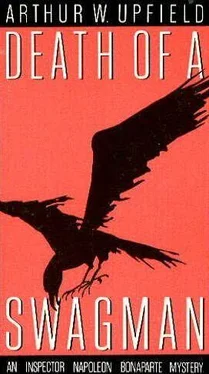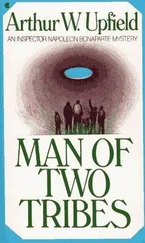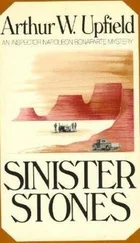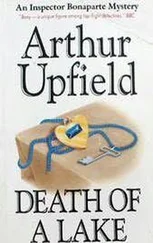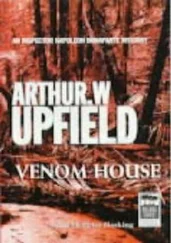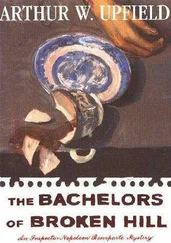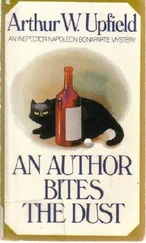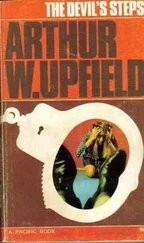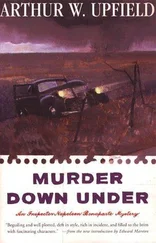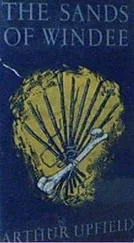Arthur Upfield - Death of a Swagman
Здесь есть возможность читать онлайн «Arthur Upfield - Death of a Swagman» весь текст электронной книги совершенно бесплатно (целиком полную версию без сокращений). В некоторых случаях можно слушать аудио, скачать через торрент в формате fb2 и присутствует краткое содержание. Жанр: Классический детектив, на английском языке. Описание произведения, (предисловие) а так же отзывы посетителей доступны на портале библиотеки ЛибКат.
- Название:Death of a Swagman
- Автор:
- Жанр:
- Год:неизвестен
- ISBN:нет данных
- Рейтинг книги:4 / 5. Голосов: 1
-
Избранное:Добавить в избранное
- Отзывы:
-
Ваша оценка:
- 80
- 1
- 2
- 3
- 4
- 5
Death of a Swagman: краткое содержание, описание и аннотация
Предлагаем к чтению аннотацию, описание, краткое содержание или предисловие (зависит от того, что написал сам автор книги «Death of a Swagman»). Если вы не нашли необходимую информацию о книге — напишите в комментариях, мы постараемся отыскать её.
Death of a Swagman — читать онлайн бесплатно полную книгу (весь текст) целиком
Ниже представлен текст книги, разбитый по страницам. Система сохранения места последней прочитанной страницы, позволяет с удобством читать онлайн бесплатно книгу «Death of a Swagman», без необходимости каждый раз заново искать на чём Вы остановились. Поставьте закладку, и сможете в любой момент перейти на страницу, на которой закончили чтение.
Интервал:
Закладка:
Ahead stood a corrugated iron hut, with, a hundred yards south of it, the windmill over the well and the iron reservoir tank perched on its high stand. The lines oftroughing radiating from it appeared like the fire-hardened hafts of aboriginal throwing spears, black on the white sand.
The door of the hut was in its east wall. Beyond it by a dozen yards was a construction of cane grass in which was kept the cool safe for the storage of meat. And beyond that, some three hundred yards away, was the base of the sand range.
Marshall halted his car between the hut and the meat house. The hut was the usual monstrosity of iron nailed to a wood frame. There was not even a window to it, an opening in its west wall being closed at this time by a trap on hinges.
“What a salubrious resort at which to spend the summer vacation,” observed Bony. “How one would enjoy the summer breezes, the rarefied air, the perfume of flowers, the song of birds. Don’t get out yet.”
“Quite enough, any way,” Marshall said, reaching for pipe and tobacco.
“Were it not for the blowflies and the crows somewhere up there on the Walls of China, there would be no sounds our human ear could register,” Bony noted, and become busy with tobacco and paper. “You wouldn’t think, would you, that in this place of spotless white-if we can disregard that hut-a man could meet with a violent end? Ah me, how truthfully it was written: ‘The evil men do lives after them.’ For years and years to come men will say: ‘A murder was committed here.’ They may even say: ‘Two murders were committed here.’ ”
Marshall had struck a match, had brought its flame against the tobacco in his pipe, but he did not draw upon it.
“What’s that?” he demanded.
“What is what?” countered Bony mildly.
“What was that about two murders being done in this place?”
“Oh, I was just letting my imagination have a little freedom. But let us be serious. Take note, and profit by it, of the difference of my approach to the scene of a crime from that of your own and Redman’s. I sit back in the comfortable seat of this car and leisurely smoke a cigarette whilst observing the scene of a crime now several weeks old, and give my imagination a slack rein. What did you and Gleeson and Redman do? What was your approach?”
Marshall grunted.
“Go on, I’ll buy it,” he urged.
“Firstly, then, you and Gleeson arrived here in a car with such speed that the car probably skidded to a halt. You threw open the doors, leapt out, and rushed pell-mell into the hut to take a look-see at the body. Secondly, Redman and his colleagues arrived in manner similar but probably much faster. It is unlikely that they gave themselves time to open the car doors. It is likely that they fell out before the car was stopped, bounced on the white sand and, with the maintained velocity, shot into the hut to stare at the alleged bloodstains and make notes in small books. Ah… me! Why will men persist in thinking that accomplishment is regulated by muscular activity?”
“Search me,” responded Marshall, who knew that Bony’s picture was actually an exaggeration. He had got his pipe alight, and he half turned to look at his companion, to see the well-moulded nostrils of the slender nose appreciating the aroma of tobacco smoke.
“Listen, Marshall, for sometimes I talk downright common sense,” Bony went on. “That hut is not a house, or a flat, or an office. This Sandy Flat is not a city. Therefore an investigation of a crime committed here must be conducted on vastly different lines. Let us assume that at this very moment there is in that hut the body of a murdered man, and that we are about to investigate the circumstances under which he died, and, further, to establish who killed him.
“Now you and Redman-Gleeson might not because he is accustomed to bush work-would rush into that hut to note the position of the body and the interior generally, because the interior of that iron monstrosity is a room, or the scene of the crime. You would search for the weapon with which the deed had been done, and for clues which might identify the killer. Now wouldn’t you?”
Marshall nodded. Bony looked at him thoughtfully.
“But what do I do?” he asked blandly. “I leave the body to a uniformed constable, and the cause of death to the doctor and the coroner, and to the experts at headquarters I leave the fingerprints if any, the weapon if any, and objects more closely associated with the crime. In a city the scene of the crime is of paramount importance, for there the scene of a crime is confined to a room, an office, a flat, and, if on a street, to a space within a few feet of the body.
“Here in the bush the scene of a crime is extended far beyond its immediate locale. Someone has had to go to the scene of the crime in order to commit it, and, afterwards, to leave the scene of the crime. As the criminal does not grow wings, he needs must walk, and he does not walk about without leaving tracks of his passage for me to see. To the city detective his fingerprints: to Bony his footprints. So you will now understand how it is that I am much more interested in the ground outside a house or hut or camp than I am with the interior.
“Again assuming that there is a dead body in that hut, what do we note about its exterior?” Bony continued. “We see that Redman’s photographer made quite a good negative of the hut with the door closed, precisely as we see it today. I am almost sure that photographing the hut with the door shut was a fluke, and a very lucky one, too. Anyway, the picture shows that now blurred mark on the door which you and I see from this distance. By the way, what do you make of that chalk mark?”
“Don’t know,” responded Marshall, to add: “Looks something like a game played by Florence and her mother called noughts and crosses, doesn’t it?”
“I agree, Marshall. I suppose that the perspicacious Redman calculated that the dead man occupied his spare hours playing the game of noughts and crosses with himself. It was a probable assumption which he adopted on the grounds that the dead man was mentally deficient to live in a place like this. So that once more is stressed the absurdity of sending a city-bred man to investigate a bush crime, for Redman would not know that there are men who find contentment in living here. Redman makes no mention of that game of noughts and crosses in his reports. To him the game meant nothing, but to me it shrieks to high heaven the intelligence that George Kendall was brought to that hut a dead man.”
Marshall sighed audibly. He was beginning to find this passive attitude a little boring.
“Patience! Patience!”Bony cried. “What else do we see?”
“Sand. Ruddy sand. And the hamper and tea billy are in the back of the car.”
“Cannot you see certain marks on the ground?” urged Bony. “You will remember that it rained heavily that afternoon when Edward Bennett was buried. That was six days ago. It rained so heavily that the natural water holes were filled with water, and, consequently, no animals have since come to drink at these troughs. Neither was there cause for anyone to come here from the station homestead to make sure that the troughs were being supplied with water. Since the rain fell the wind has blown at a velocity exceeding ten miles an hour on only two days, the last being yesterday. The rain and wind wiped clean this page of the Book of the Bush for such as me to read.
“Observe… again. On this clean page of the Book of the Bush are printed the boot prints of a man. He did not arrive here by the road we came by. He came from the north, skirting the sand range. We may assume (a) that he came from Wattle Creek homestead and (b) that he was bushman enough to travel across country and (c) that he knew the position of this hut and well. Is that clear to you?”
Читать дальшеИнтервал:
Закладка:
Похожие книги на «Death of a Swagman»
Представляем Вашему вниманию похожие книги на «Death of a Swagman» списком для выбора. Мы отобрали схожую по названию и смыслу литературу в надежде предоставить читателям больше вариантов отыскать новые, интересные, ещё непрочитанные произведения.
Обсуждение, отзывы о книге «Death of a Swagman» и просто собственные мнения читателей. Оставьте ваши комментарии, напишите, что Вы думаете о произведении, его смысле или главных героях. Укажите что конкретно понравилось, а что нет, и почему Вы так считаете.
